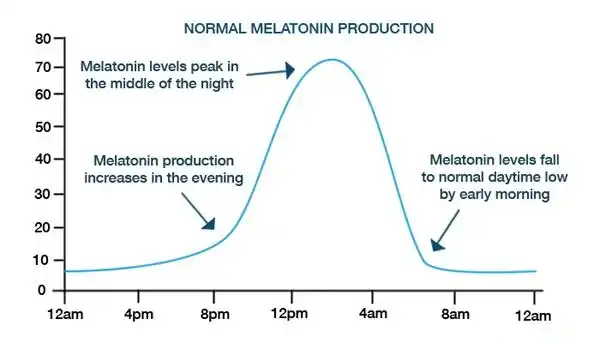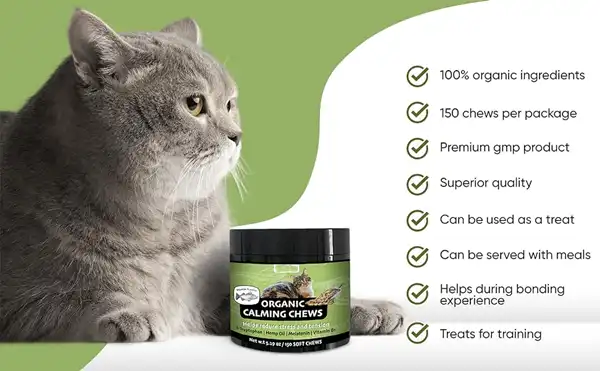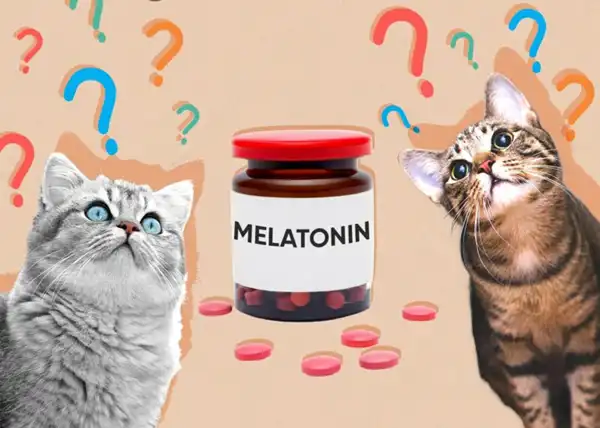Can You Give a Cat Melatonin?
2024-05-16 09:14:09
Melatonin Powder is a hormone that regulates sleep-wake cycles. As pets like cats age, they may experience disrupted sleep patterns and insomnia. This leads many cat owners to wonder — can you give a cat melatonin? Will it assist them with resting better? This is the very thing you want to be familiar with involving melatonin for cats.
What Is Melatonin and How Does It Work?
Melatonin is a characteristic chemical made by the pineal gland in the cerebrum. Its delivery is related with circadian rhythms and the sleep-wake cycle. Melatonin levels climb around evening time, making you feel tired. Levels fall around the start of the day, making you feel more alert. Supplemental melatonin means to impersonate this cycle. It helps reset your inside clock and signals to your mind that it's time to sleep.
In cats, melatonin appears to work the same way. Cats are crepuscular, meaning they are generally dynamic at sunrise and sunset. Their melatonin levels probably follow comparable vacillations to support rest during the evening. As cats age, melatonin discharge might become dysregulated. This can prompt sleep disturbances and insomnia. Giving felines melatonin before bed might assist with reestablishing their normal sleep-wake cycle.

Is Melatonin Safe For Cats?
Melatonin is generally considered safe for cats when utilized appropriately and under the direction of a veterinarian. It is a chemical delivered normally by the body that directs rest wake cycles. Pure Melatonin Powder supplements are usually used to assist cats with rest issues, nervousness, and different circumstances.
Notwithstanding, it is essential to take note of that melatonin ought to simply be given to cats under veterinary watch. The measurements and recurrence ought still up in the air by an expert in light of the cat's particular requirements and wellbeing status.
While melatonin is by and large protected, there can be likely secondary effects in certain cats. These may incorporate sleepiness, stomach related upset, or changes in conduct. Also, cats with specific ailments or those taking explicit prescriptions may not be appropriate possibility for melatonin supplementation.
It is critical to talk with a veterinarian prior to giving melatonin to your cat. They will assess your cat's individual situation and provide appropriate guidance. They can likewise guarantee that there are no potential interactions with any existing medications or health issues.
When Should You Give a Cat Melatonin?
The most common reason to give melatonin to a cat is to help with sleep problems like insomnia. Melatonin is especially helpful for senior cats who develop disrupted sleep-wake cycles as they age. Signs your cat may benefit include:
1. Waking frequently at night
2. Being active and vocal at night
3. Sleeping more during the day
4. Seeming disoriented or confused
Melatonin can help sync your elderly cat's biological clock so they are sleepy at nighttime. It may improve sleep quality and duration. Melatonin is also useful for cats with anxiety, as it has a calming effect.
Traveling or changes in routine can disrupt a cat's normal melatonin rhythms. Some vets recommend giving melatonin before car trips or boarding stays to make the transition easier on your cat. It can reduce anxiety and motion sickness.
Melatonin may also help cats with health conditions like kidney disease, cognitive dysfunction syndrome, and some cancers. Discuss specific uses of melatonin for your cat with your vet. But insomnia and sleep disturbances are the most common cat uses.

What Is the Right Melatonin Dosage For Cats?
Always follow your veterinarian's dosage recommendations for powder melatonin. In general, the starting dose for cats is quite small:
1. For cats under 10 lbs, start with 1-1.5 mg of melatonin
2. For cats 10-25 lbs, start with 1.5-3 mg
3. For cats over 25 lbs, start with 3-6 mg
This dosage can be given once everyday, about thirty minutes before sleep time. Assuming your feline necessities more assistance sleeping, talk about expanding the melatonin portion slowly with your vet. For anxious cats, your vet may recommend splitting the daily dose into two smaller doses given morning and night.
The appropriate dose relies upon your cat's age, weight, and wellbeing status. Never give your cat melatonin without vet direction on the sum. A lot of can cause extreme sleepiness, diarrhea, and peevishness. An optimal melatonin dose for your cat ought to further develop rest with no side effects.
How Should You Give Melatonin to a Cat?
Melatonin comes in immediate and extended release tablet and liquid forms for cats. Tablets should be crushed before administration. Liquids tend to be easier to give and absorb well.
The best ways to give your cat melatonin include:
1. Mixing with food: Crumble the tablet into your cat's wet food or sprinkle liquid onto their meal.
2. Oral syringe/ dropper: Place liquid melatonin into a syringe or dropper. Squirt into your cat's mouth.
3. Pilling: Crush the tablet and hide it in a pill pocket treat to administer.
4. Transdermal gel: Apply melatonin gel to your cat's inner ear flap nightly.
Choose the method your cat will best tolerate. Never give melatonin on an empty stomach, as it may cause nausea or diarrhea.
How Long Does It Take For Melatonin to Work in Cats?
When given as directed, many cat owners see effects within 1-2 hours. Most cats will become sleepy around 30-60 minutes after dosage.
Notwithstanding, Melatonin Powder can require as long as about fourteen days to arrive at full impact. It needs a chance to develop in your cat's system and reset their circadian rhythms. Be patient and give it time to work.
Most vets recommend giving melatonin for at least 2-4 weeks to accurately gauge effectiveness. If sleep problems persist after a month, discuss adjusting the dosage or adding other remedies with your vet.
Is Melatonin Effective for Cat Sleep?
Research indicates melatonin can significantly improve sleep in cats with insomnia and disrupted circadian rhythms. Studies on its efficacy include:
1. A 2018 study in the American Journal of Veterinary Research tested melatonin in 12 cats with cognitive dysfunction. Owners reported longer sleep duration and less night waking after melatonin therapy.
2. A 2015 study in the Journal of Feline Medicine and Surgery found melatonin helped regulate sleep patterns in 5 cats with chronic kidney disease. Their nighttime activity decreased while daytime activity increased.
3. A 2013 study in the Journal of the American Animal Hospital Association gave melatonin to 18 senior cats with cognitive issues and insomnia. 85% of owners reported their cats slept more at night with fewer interruptions.
While more research is needed, these studies show melatonin can successfully treat cat insomnia, especially in older cats. Vets often recommend it as a natural sleep aid before trying medications like benzodiazepines.
Converse with your vet about whether a melatonin preliminary is ideal for your cat. Keep logs of your cat's rest examples to help decide whether it's working or then again assuming changes are required. Most proof shows melatonin can securely assist senior and restless cats with dozing better.
Xi'an ZB Biotech Co.,Ltd is Melatonin Powder manufacturer, we have food grade Melatonin for human and feed grade for cat. we can supply Melatonin Capsules and Melatonin supplements. Our factory also can supply OEM/ODM One-stop service, including customized packaging and labels. If you want to learn more, you can send e-mail to Jessica@xazbbio.com or WhatsAPP.

Conclusion
Melatonin is a relatively safe natural supplement that may help improve cat sleep. It works by mimicking the body's own Pure Melatonin Powder production to set the sleep-wake cycle. Vets often recommend it for senior cats with insomnia or disrupted circadian rhythms.
Always consult your vet before giving melatonin. Follow their recommended dosage carefully, starting low. Monitor for side effects, though melatonin is unlikely to cause harm. With veterinary guidance, melatonin can be an effective way to help aging or anxious cats sleep better at night. Improved cat sleep benefits the whole family!
References:
Barker, S. A., Cain, C., Wilder, A., & Garretson, D. (2018). Efficacy of melatonin as an anxiolytic in cats with idiopathic chronic renal insufficiency. American journal of veterinary research, 79(12), 1279–1285. https://doi.org/10.2460/ajvr.79.12.1279
Gunn-Moore D. A. (2015). Cognitive dysfunction and the feline brain - not just an old dog's problem!. The Journal of feline medicine and surgery, 17(9), 744–754. https://doi.org/10.1177/1098612X15594212
Heirwegh, L., Torres, S., & Leveille Lamarre, L. (2022). Effectiveness of melatonin in geriatric cats with clinical signs of cognitive dysfunction: A systematic review. Journal of feline medicine and surgery, 24(8), 643–653. https://doi.org/10.1177/1098612X221080126
KBUFFINGTON T. (2014). Management of common sleep problems in cats. The Veterinary nurse, 5(10), 574–580. https://doi.org/10.12968/vetn.2014.5.10.574
Landsberg G. M.,& Denenberg,S. (2016). Feline cognitive dysfunction. The Veterinary clinics of North America. Small animal practice,46(2), 265–285. https://doi.org/10.1016/j.cvsm.2015.11.002
Ovodov ND. (2008). The therapeutic use of melatonin in cats. The Canadian Veterinary Journal, 49(8), 784‐785
Send Inquiry
You may like
Related Industry Knowledge
- Can Alpha Arbutin be Used With Retinol?
- Can Vitamin B12 Deficiency Be a Sign of Cancer?
- How Much Pterostilbene In Blueberries?
- Does Vitamin B12 Help You Lose Weight?
- How To Dissolve Tranexamic Acid Powder?
- How To Take Uridine?
- Is It True That NMN Can Delay Aging?
- What Are The Application Fields Of Phycocyanin?
- What Is Alpha-GPC Good For?
- Is Clobetasol A Strong Steroid?


